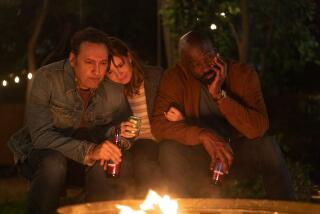Cheers to the long run
- Share via
One night next May, Seattle’s most famous radio psychiatrist, Dr. Frasier Crane, will undergo the most profound form of separation anxiety: exile from the network prime time that has pretty much been his home for two decades.
As a new television season is starting and close to 40 new network series are set to bow, “Frasier” will conclude one of the longest-running, most successful tenures in television history. Kelsey Grammer and colleagues will be back in the job pool -- although none of the show’s principals is likely to starve any time soon -- and NBC will conclude a relationship that began with “Cheers,” then continued with its “Frasier” spinoff when “Cheers” ended in 1993.
“I started out wanting nothing more than to be a working actor,” Grammer says. “ ‘Frasier’ has given me a life I never would have dreamed of having and has brought arguably the greatest success to all of us. It’s a show we’re proud of.”
With smart writing and a finely tuned ensemble, the tale of pompous psychiatrists Frasier and Niles Crane, their crotchety ex-cop dad, Martin, and his goofy home health care aide, Daphne Moon, has earned award after award, including a record 30 Emmys. “Frasier” is the first series to win five consecutive Emmys for outstanding comedy series, gliding past such four-time winners as “The Dick Van Dyke Show,” “All in the Family” and even parent “Cheers.”
But after its being nominated for best comedy series its first eight seasons, the Emmys have bypassed “Frasier” the last two years in that top category. The showiest prize it could nab at tonight’s awards ceremony would be a supporting-actor-in-a-comedy nod for cast members David Hyde Pierce or John Mahoney.
Still, for “Frasier’s” cast and crew, there’s more at stake than industry accolades as they head for their last curtain call.
The process of trying to go out a winner was well underway by summer in the “Frasier” offices and sets on the Paramount Pictures lot in Hollywood. There, over the course of the last few months, they have mixed the hard work of preparing for a 11th and final season with the sometimes even harder task of preparing to move on.
“I’m in complete denial,” says Peri Gilpin, who plays radio shrink Crane’s feisty producer, Roz Doyle. “I know the situation will never be duplicated, no matter what I do in my life. Emotionally, it’s going to be tough.”
Two episodes back to back on Tuesday launch the show’s final season. When the “Frasier” cast gathered to read the show’s initial script aloud in early August, a packed conference room sighed audibly as director and series co-creator David Lee began by announcing: “This is the last first reading.”
“It was like you were looking at things for the first time again because you were looking at them for the last time,” recalls actor David Hyde Pierce, who plays brother Niles Crane. “Walking out of the reading, you mentally put yourself in the position of the day after [the show wraps], when it was the ‘Frasier’ set.”
THE CHALLENGE
So begins a television season that will also almost certainly bid farewell to NBC’s “Friends,” HBO’s “Sex and the City” and possibly CBS’ “Everybody Loves Raymond.”
Beyond just figuring out how to wrap up the series, “Frasier’s” writers, producers and cast have the extra challenge of restoring some of the diminished luster. In the last few seasons, many viewers, as well as some people intimately involved in the show, have found the humor diminished and believe that some of the show’s rich interactions among the core cast have grown tired. Ratings dipped, and the excitement that once surrounded the show began to disappear.
“[Co-creator] Peter Casey, Kelsey and I decided it was time for it to go,” Lee says. “It’s getting more and more difficult to keep ‘Frasier’ fresh and hard to keep jumping over the bar when it’s set that high.”
Adds Pierce, also aware of the challenges, “There’s something very classy about not just going until finally someone shoots us but saying we think there’s a way to shape it so that this 11-year-long piece of television will end as well as it began.”
“Frasier” debuted Sept. 16, 1993, when creators Lee, Casey and the late David Angell moved “Cheers” regular Dr. Frasier Crane from that bar in Boston to a radio call-in advice show in Seattle. Besides series regulars Grammer, Pierce, Gilpin, Jane Leeves and John Mahoney, hundreds of “extras” like Mel Brooks, Stephen King, John McEnroe, Yo-Yo Ma and even Paramount studio chief Sherry Lansing have called in “performances” to Frasier Crane’s radio show.
“We all knew it was good when we did the pilot,” recalls Leeves, who plays Daphne, now married to Niles. “But it wasn’t until two or three years into it that you start to believe you’re on a hit. Just because something’s good doesn’t mean it’ll last.”
But last it has. “Most of the actors here are accustomed to the theater, where the longest job you have is a year or maybe two,” observes Juilliard-trained Grammer. “So there’s a kind of reminiscent excitement about going forward again into some unknown. It’s like returning to our roots.”
What may never be the same, though, is the financial security the show provided its key participants. As the show’s star and an executive producer, Grammer signed a deal in 2001 that reportedly pays him $1.6 million per episode, which at the time was the most of anyone on TV and is now second only to the salary of “Everybody Loves Raymond” star Ray Romano. Pierce, too, reportedly makes upward of $1 million per episode for a show that will bring in hundreds of millions of dollars to Paramount in off-network syndication revenue.
Grammer, who began portraying Frasier on “Cheers” in 1984, readily admits to his delight in tying James Arness’ record of 20 seasons as “Gunsmoke’s” Marshal Matt Dillon. But he also acknowledges his sadness in seeing the show end. “I take mental notes and memorize certain things around me,” Grammer says. “The way the lights shoot down on the cast when they’re talking, the way the piano looks. It’s been a big part of our lives.”
SURROGATE FAMILY
The word “family” is a constant in conversation with people on “Frasier.” Even before they knew the show was ending, for instance, the show’s five stars took the entire crew, with spouses -- more than 200 people -- to Las Vegas as a Christmas present last year. “When I emigrated from England to the United States at 19, I never thought anything would be as wrenching as taking myself away from my brothers, sisters and parents,” says actor Mahoney, who inhabits the role of father Martin. “But this will be like leaving my family all over again.”
Gilpin met her husband, artist Christian Vincent, through “Frasier” executive producer Christopher Lloyd, had her rehearsal dinner at bridesmaid Leeves’ beach house and was married at Grammer’s house. Leeves met her Paramount executive husband, Marshall Coben, at a “Frasier” Christmas party. Now expecting her second child, Leeves quips: “Paramount has been good to me.”
While writers made Daphne overweight, not pregnant, during her first pregnancy a few years ago, Leeves’ second pregnancy has again given them several options for the final season’s story line. Picking up where the 10th season ended, the first episode not only tackles Gilpin’s Roz Doyle getting her old job back as Frasier’s feisty producer at the radio station but features Daphne and Niles aggressively pursuing pregnancy.
“In the 11th season of the show, you’re fighting against the fact you’ve already done 240 episodes,” comments Bob Daily, who wrote the season’s first episode. “So you’re not only trying to find something ‘Friends’ or ‘Raymond’ or ‘I Love Lucy’ hasn’t done, you’re also trying to find something that you haven’t done.”
Guiding the last season are returning executive producers Christopher Lloyd and Joe Keenan, longtime “Frasier” writer-producers who had struck out on their own after the show’s seventh season. Keenan, who just finished writing his 22nd script for the series, says that “the idea of being part of its final season was irresistible.”
Lloyd, too, found the challenge alluring. He left after seven seasons because he was exhausted, he says, but “it was hard to pass up the opportunity to write the final chapter of a great story. The reality of television is you usually don’t get to write the last chapter. The networks write it for you. We could find a nice way to send these people off into the sunset.”
Lloyd hints that this season’s story lines include Niles going through a midlife rebellious period with Martin and a love triangle between Frasier and Martin over Frasier’s old baby-sitter. Frasier will go back into private practice for “more one on one with a lot of troubled but, we hope, colorful characters” -- including one patient with coulrophobia, which Lloyd defines as “a paralyzing fear of clowns.”
While they haven’t written the show’s final episode, Grammer says, “I always had an idea for the last show. Chris and I have discussed it, and surprise, surprise, we have a similar vision. Of course we’re not going to tell anybody.”
Meanwhile, the cast, writers and others are already making plans for life after “Frasier.” Keenan and Lloyd are contracted to develop a new show for Paramount, while novelist Keenan also plans to finish his third novel, put on a back burner while he’s been writing “Frasier.”
Mahoney compares their ensemble to “a little rep company” and the show’s theater-minded cast all express interest in doing more stage work. Gilpin, for instance, is starring in “As Bees in Honey Drown” at the Pasadena Playhouse, while Leeves starred in “Cabaret” on Broadway last summer.
But retiring is never easy. The Jack Russell terrier Moose, now more than 13 years old, was replaced by son Enzo as the show’s ubiquitous dog, Eddie, and dog trainer Mathilde DeCagny confides, “Moose misses it. He comes once a week. Otherwise he feels left out.”
For “Frasier” crew members, hope springs eternal, production designer Roy Christopher observes. “They ask: What if the show goes through the roof? One of the guys came to the art department and asked us to make up bumper stickers that said: ‘One More Year.’ They just love the show.”
At this point, Keenan adds, the mood on the soundstage is “enormously upbeat. I think the fact it’s ending hasn’t sunk in yet. We still have 21 more to shoot. When you can count them down on the fingers of one hand, there should be a little more wistfulness.”
Calling Frasier “one of most important comedies in the history of television, certainly of the last decade,” NBC Entertainment President Jeff Zucker talks of the “integral role” the show played in the network’s success. While Zucker concedes that the network didn’t give Frasier a strong lead-in and ratings started to decline, he adds, “It’s obviously going to leave a hole in our schedule and in our hearts when it goes away.”
At Paramount TV, where the show began and will end, Paramount Television Production President Garry Hart says, “I can’t imagine Paramount without ‘Frasier.’ ” Observing a recent rehearsal, casting director Jeff Greenberg predicts that when “Frasier” ends, “shows will be vying to be on Stage 25 because it has a great vibe. ‘Cheers,’ and then ‘Frasier.’ It’s really been a lucky stage.”
More to Read
The complete guide to home viewing
Get Screen Gab for everything about the TV shows and streaming movies everyone’s talking about.
You may occasionally receive promotional content from the Los Angeles Times.






